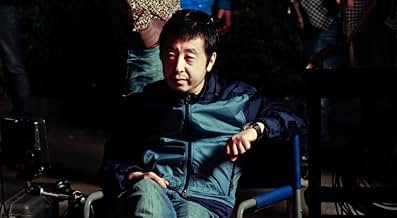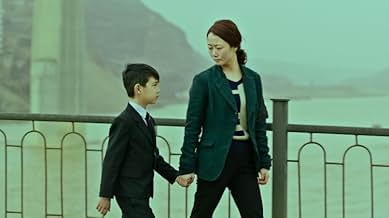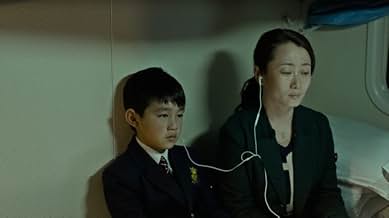NOTE IMDb
6,9/10
6,6 k
MA NOTE
La vie de Tao et de ses proches est explorée à travers trois périodes différentes : 1999, 2014 et 2025.La vie de Tao et de ses proches est explorée à travers trois périodes différentes : 1999, 2014 et 2025.La vie de Tao et de ses proches est explorée à travers trois périodes différentes : 1999, 2014 et 2025.
- Réalisation
- Scénario
- Casting principal
- Récompenses
- 26 victoires et 42 nominations au total
Yi Zhang
- Zhang Jinsheng
- (as Zhang Yi)
Zijian Dong
- Zhang Daole aka Dollar
- (as Dong Zijian)
Histoire
Le saviez-vous
- AnecdotesSome sequences (in the 1999 segment) were filmed by the director and the cinematographer back in 2001.
- GaffesThe young boy who plays Tao's son in 2014 is also part of the crowd of children that watches her perform at the new year's celebrations in 1999.
- Crédits fousThe title appears more than forty minutes after the beginning of the movie.
- Bandes originalesGo West
Written by Henri Belolo, Jacques Morali and Victor Willis, Neil Tennant and Chris Lowe
Performed by Pet Shop Boys
Commentaire à la une
Mountains May Depart starts on perhaps my favourite opening shot of the year. Kicking it off with the Pet Shop Boys' vibrant song "Go West," we're straight in the middle of a dance routine with a room full of people clumsily bopping in sync. It's infectious and filled with unbridled hope and joy. Unfortunately, it's downhill from here, though the film is never aiming for the same type of exuberance. I'm not familiar with Jia Zhangke or his following – Walter Salles apparently has a hotly anticipated documentary about the director at this festival – but Mountains May Depart seems like an endearing and accessible introduction. Telling three stories in three separate time periods, I do enjoy the way it explores causality in how these small relationships and dramas at one time can feed into a dilemma 25 years later.
The first story, set during the turn of the century in 1999 when Chinese capitalism was healthy, follows a love triangle between Tao, an aerobics instructor, Zhang, an egotistic entrepreneur, and Liangzi, a man who works for Zhang. The three hang out as friends but Zhang can't bear the idea of Tao getting close to Liangzi and despite emotional logic, it's social economical pressures that make decisions. Cut to 2014, Tao and her beau have divorced and she's now estranged from her son. Upon the death of her father, her son is forced to visit and she must make the decision of how connected she should be to him throughout his life. Then off to an imagined Australia in 2025, her son doesn't remember her and currently struggles with his relationship with his father where they now have a language barrier. With the help of a teacher he grows attached to, he goes in search for Tao.
Each section of the film is approached in a different way, reminiscent of the way last year's The Grand Budapest Hotel and Mommy played with ratios. The first section is a tight 4:3, the second is a full frame, and the third is widescreen. However, these feel like they represent the period and the environment moreso than the character's emotions, with exception to the mid- section, which ideally captures Tao's regret and longing. It's a mixed bag depending on the talent, with some tender moments landing strong and some clumsily misguided, the latter most prominent in the last section. That first section has a bait and switch for the decades long heartache that the seemingly innocent love triangle causes. The theme of how people drift apart no matter how close they are resonates but it's unbearably melancholic without Zhangke offering much of a satisfying a silver lining.
It's a shame that despite the film's strengths it has too many loose ends and unnecessary moments that don't appear to add to the character arcs or the themes. With a 25 year story like this where no single character carries us through the whole film, every moment has to count to something. There's little justification as to why the third section is in glorious widescreen and set in Australia, but perhaps this just speaks to how disconnected it is from the rest of the film. While mostly drenched in Chinese culture, I wish Zhangke didn't resort to certain American clichés such as sad montages of characters having deep thoughts set to music. However, with those time gaps, Zhangke does harness a powerful nostalgic through just a few song motifs carried through all three sections that are well executed. Both disarmingly simple and complex, his ambition is admirable, but it doesn't quite reach the potential that this expanse allows it to travel.
7/10
Read more @ The Awards Circuit (http://www.awardscircuit.com/)
The first story, set during the turn of the century in 1999 when Chinese capitalism was healthy, follows a love triangle between Tao, an aerobics instructor, Zhang, an egotistic entrepreneur, and Liangzi, a man who works for Zhang. The three hang out as friends but Zhang can't bear the idea of Tao getting close to Liangzi and despite emotional logic, it's social economical pressures that make decisions. Cut to 2014, Tao and her beau have divorced and she's now estranged from her son. Upon the death of her father, her son is forced to visit and she must make the decision of how connected she should be to him throughout his life. Then off to an imagined Australia in 2025, her son doesn't remember her and currently struggles with his relationship with his father where they now have a language barrier. With the help of a teacher he grows attached to, he goes in search for Tao.
Each section of the film is approached in a different way, reminiscent of the way last year's The Grand Budapest Hotel and Mommy played with ratios. The first section is a tight 4:3, the second is a full frame, and the third is widescreen. However, these feel like they represent the period and the environment moreso than the character's emotions, with exception to the mid- section, which ideally captures Tao's regret and longing. It's a mixed bag depending on the talent, with some tender moments landing strong and some clumsily misguided, the latter most prominent in the last section. That first section has a bait and switch for the decades long heartache that the seemingly innocent love triangle causes. The theme of how people drift apart no matter how close they are resonates but it's unbearably melancholic without Zhangke offering much of a satisfying a silver lining.
It's a shame that despite the film's strengths it has too many loose ends and unnecessary moments that don't appear to add to the character arcs or the themes. With a 25 year story like this where no single character carries us through the whole film, every moment has to count to something. There's little justification as to why the third section is in glorious widescreen and set in Australia, but perhaps this just speaks to how disconnected it is from the rest of the film. While mostly drenched in Chinese culture, I wish Zhangke didn't resort to certain American clichés such as sad montages of characters having deep thoughts set to music. However, with those time gaps, Zhangke does harness a powerful nostalgic through just a few song motifs carried through all three sections that are well executed. Both disarmingly simple and complex, his ambition is admirable, but it doesn't quite reach the potential that this expanse allows it to travel.
7/10
Read more @ The Awards Circuit (http://www.awardscircuit.com/)
- Sergeant_Tibbs
- 16 oct. 2015
- Permalien
Meilleurs choix
Connectez-vous pour évaluer et suivre la liste de favoris afin de recevoir des recommandations personnalisées
- How long is Mountains May Depart?Alimenté par Alexa
Détails
- Date de sortie
- Pays d’origine
- Site officiel
- Langues
- Aussi connu sous le nom de
- Mountains May Depart
- Lieux de tournage
- Fenyang, Shanxi, Chine(Tao's home town)
- Sociétés de production
- Voir plus de crédits d'entreprise sur IMDbPro
Box-office
- Montant brut aux États-Unis et au Canada
- 82 913 $US
- Week-end de sortie aux États-Unis et au Canada
- 5 550 $US
- 14 févr. 2016
- Montant brut mondial
- 5 215 660 $US
- Durée2 heures 6 minutes
- Couleur
- Mixage
Contribuer à cette page
Suggérer une modification ou ajouter du contenu manquant

Lacune principale
By what name was Au-delà des montagnes (2015) officially released in India in English?
Répondre
























